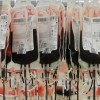Crops modified to make fish oils
Interview with
A huge issue on the sustainability front is overfishing. Fish oils are an important part of our diets, with molecules such as EPA and DHA being beneficial for brain health. But excessive harvesting of ocean stocks is damaging marine ecosystems. Johnathan Napier, research leader at Rothamsted research, has potentially found a solution to this problem using genetic modification. This differs from gene editing, but he hopes that the precision breeding bill marks an important first step to gateway other GM produce down the line. He explained to Chris Smith what his lab has been working on…
Johnathan - What we've done after decades of effort is we can make fish oils in plants.
Chris - Isn't that what eating fish is for though? I mean, I could go out and buy some salmon and eat that, couldn't I. Why do I need plants for that?
Johnathan - Actually, lots of people don't eat enough fish. And contrary to popular belief, There aren't plenty more fish in the sea. There's not enough fish oils to go around to ensure that everybody on the planet gets correct nutrition.
Chris - I thought one way of combating this was we were just farming fish and growing enormous amounts of fish to make sure we don't deplete ocean stocks?
Johnathan - We do farm lots of fish. Now most of the fish that people would consume has been farmed. All the fish you buy in the supermarket, almost all of that's probably been farmed. But the Achilles heel, if you like, of fish farming, is that actually - this is the really bizarre thing - fish don't make fish oils, but they need them as part of their diet. So we have to feed the farmed fish fish oils that have been extracted out of the oceans. So you have this unsustainable cycle of extracting fish oils out of the ocean to feed to farmed fish.
Chris - Hang on a minute. So you are saying, I need to eat lots of oily fish to get fish oils, but fish need to eat oily fish to get fish oils. So where do the fish get it from then?
Johnathan - So the fish get it from their diet. You can think of our oceans as a soup of omega3 fish oils - but we've already decided that's not really a good name because fish don't make omega3 fish oils. It's actually the marine microbes; the little plankton and the microalgae that are in the base of the food web in the ocean. They're the things that are making the omega3 oils. And just in every layer in the food web in the oceans, those fatty acids are accumulating.
Chris - How did you (a) find out what the algae were doing to make these essential fatty acids in the first place? So how did you know what to take from them? And how did you get that to work in plants and indeed what sort of plants?
Johnathan - We started our project to try and make these particular omega3 fatty acids. And it was well known that algae were making them, but nobody knew what the genes were. And so we really had to embark on a project to find the genes in the algae that make the omega3 polyunsaturated fatty acids, and identify those genes and introduce them one by one into plants to effectively rebuild the algal pathway in a higher plant so that the plant was now making these long chain omega3 fatty acids.
Chris - And what plant have you put them in?
Johnathan - The one that works really well for us is a plant called camelina, which is like a cousin of oil seed rape canola.
Chris - What's the concentration that you achieve? How many cod liver oil capsules do I have to pop to be equivalent to a handful of the seeds of one of these plants?
Johnathan - In terms of the amount of EPA and DHA that we make in our oil, the levels that we make are actually a little bit higher than you would find in cod liver oil. You should be taking probably a couple of teaspoons of cod liver oil a week. Well, probably you could only take one teaspoon of our GM camelina oil. We've done human studies with these oils, and we now know that our plant fish oil replacement is exactly the same in terms of how it's taken up by the human body as a regular fish oil.
Chris - Have you actually gone through chemical by chemical what your plants make in order to prove that in stitching in these additional genes the biochemistry of the plant hasn't changed in some other unpredictable way?
Johnathan - There's always variation between one plant and another. We've done a great deal of analysis of our transgenic plants, and we've not seen any difference we think is significant or cause for concern.
Chris - At the moment, the legislation forbids you from doing what you are doing in terms of using it for direct access into the human marketplace. People are lobbying to try to change that. You've been one of those people who've been advocating for that. How's it gone down? How are your arguments being received?
Johnathan - The government, in general, knows that the legislation that was developed within the EU for covering GM and gene editing is too restrictive and impedes innovation. We've got something useful and we know that it's safe and we know that it works well. The mechanisms to bring this to market are too complicated, too burdensome, too expensive, that doesn't really help anybody, but I think we're still somewhere away from the government moving towards changing how GM foods are regulated. But I think their direction of travel is clear, which I think is really exciting and really promising.










Comments
Add a comment